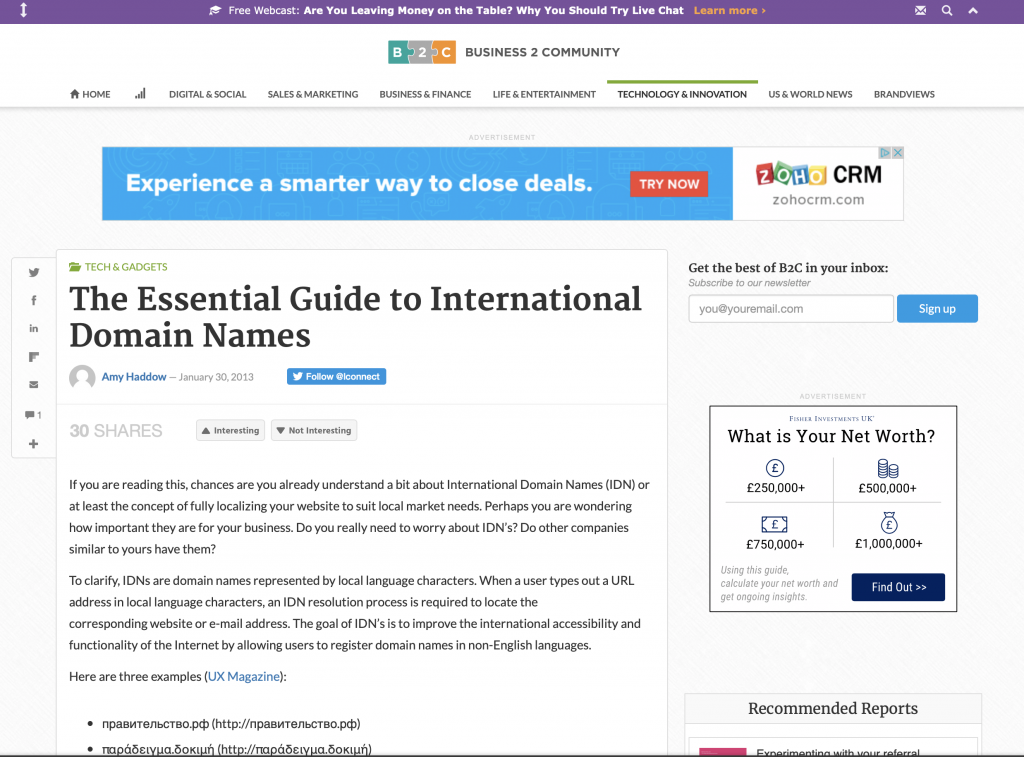B2C – The Essential Guide to International Domain Names
As Marketing Copywriter for leading language service provider, Language Connect, I became a regular contributor in B2C – Business 2 Community – covering digital progression within the realm of language, translation, localisation and emerging markets.

Link:
Full article:
B2C – The Essential Guide to International Domain Names
If you are reading this, chances are you already understand a bit about International Domain Names (IDN) or at least the concept of fully localizing your website to suit local market needs. Perhaps you are wondering how important they are for your business. Do you really need to worry about IDN’s? Do other companies similar to yours have them?
To clarify, IDNs are domain names represented by local language characters. When a user types out a URL address in local language characters, an IDN resolution process is required to locate the corresponding website or e-mail address. The goal of IDN’s is to improve the international accessibility and functionality of the Internet by allowing users to register domain names in non-English languages.
Here are three examples (UX Magazine):
- правительство.рф (http://правительство.рф)
- παράδειγμα.δοκιμή (http://παράδειγμα.δοκιμή)
- 례.테스트 (http://실례.테스트)
Domain names in general are hot property. Securing even a local one in your brand name can involve high costs and negotiations with existing proprietors, and most start-ups will need to consider available domain names before deciding on a brand name.
People are growing increasingly aware of the importance of international domain names. Once ‘.com’ (the world’s most popular top level domain) goes multilingual, it is safe to assume costs for IDN’s will soar and availability reduce.
Securing an IDN in your brand name now could be the best investment you make this year.
I’m not operating an international business – why would I need an IDN?
The internet opens us all up to a global market, whether we intentionally target overseas or not. Ensuring your brand ‘translates’ in international markets is essential in maximising the online success of your business.
A new European Union study – Born Global: The Potential of Job Creation in New International Businesses, supports the opinion that start-up businesses should look to tackle overseas markets regardless of how established they are in home markets. The study suggests that start-ups driven to do more business abroad in the early stages of development tend to be more profitable and innovative than those that don’t, showing faster growth and incremental work hires.
English currently dominates the number 1 position for languages used on the web, but Chinese and Spanish are not far behind. We tend to forget that most of the world’s population is non-English speaking. Globalization and the adoption of technology by indigenous and less developed countries means that the web is now more multilingual than ever before, and we can expect this sociographic trend to continue.Recommended for You
China now has 564 million internet users and an internet penetration score of 42.1% according to the China Internet Network Information Centre. Populations will naturally perform internet searches in their native language – this is where localization plays an essential part in your online success. Adoption of an IDN is just one element of localization, but an essential one. Without ensuring your site is as searchable as possible, additional localization efforts will come to nothing as traffic will not be driven to your pages.
Who else has made the move towards international domain-ation?
In 2010, Russia opened its own top-level IDN, .Рф (which is the Cyrillic abbreviation of Russian Federation) for registration. In less than a year, nearly one million IDNs were registered, making .Рф the most popular IDN and one of the world’s most popular country codes.
With over 20 official languages using a range of scripts, India now boasts seven approved IDNs.
So what next?
By registering all international domain names you think you may need for your products and services now, you will ensure you are at a distinct competitive advantage in a global marketplace.
Businesses have already started paying above market value for IDN’s currently owned by other companies so get researching and secure the global future of your brand.S
